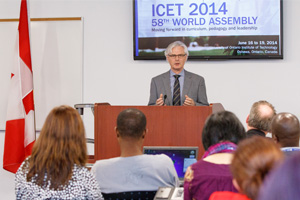UOIT hosts international teacher education conference
June 20, 2014

The University of Ontario Institute of Technology (UOIT) hosted hundreds of international education leaders June 16 to 19 during the 58th World Assembly of the International Council on Education for Teaching (ICET).
The event at UOIT marks only the second time the ICET World Assembly has taken place in Canada (Vancouver, British Columbia was the site of the 32nd World Assembly in 1985).
Through the theme Moving Forward in Curriculum, Pedagogy and Leadership, the Assembly generated tremendous discussion about practical concerns affecting teacher education and professional development, curriculum development and its implementation.
“The University of Ontario Institute of Technology was proud to host this important international forum where we get a chance to share best practices,” said Dr. Shirley Van Nuland, Associate Professor, UOIT Faculty of Education, and 2014 ICET World Assembly organizer. “All countries faces similar challenges about inclusion and social justice, and student retention and engagement. It’s important for us to be asking questions like ‘What if we did it this way?’ in order to gain new insights that we can apply to improve the education of teachers and students worldwide.”
ICET’s mission is to improve the educational experiences and outcomes of learners in all parts of the world. The Council provides opportunities for those involved in their education to share knowledge, resources and expertise and to enhance the quality of teaching and learning, and improve life opportunities for young people.
Next year’s ICET World Assembly will be held in Naruto City, Japan.



